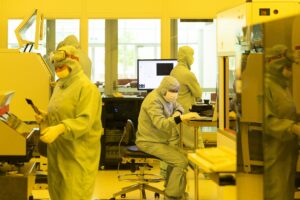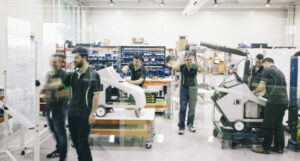Home > News & Events > Building a workforce to meet nanotech needs

Click here to view the ‘Nanotechnology and Nanofabrication Technicians: Final Report on Essential Knowledge, Skills and Attitudes’ report. Click here to download the PDF of this announcement.
Australia is ready to train the workforce necessary to meet the needs of nanotechnology industries, according to analysis conducted by ANFF and TAFE SA.
The joint research shows that Australia can leverage a fantastic foundation of resources and infrastructure to build a nanotech manufacturing workforce.
With only a few tweaks to existing course offerings, Australians can gain the training, qualifications, and skills to work in tech industries that will play an intrinsic part in Australia’s future economy. These moves will lead to the creation of future-proof jobs for Australians, while making it far easier to keep manufacturing on sovereign soil.
These findings are timely – this workforce will underpin the success of Australia’s aim to harvest homegrown innovation in order to boost the economy.
Micro and nanofabrication is essential to furthering research into priority areas and translating the resulting technologies; it’s also central to the companies that will manufacture these technologies in the future. This is evidenced by Micro-X, an SA-based advanced manufacturer that is a global leader in x-ray technologies.
ANFF, Australia’s open access micro and nanofabrication network, is currently enabling clients working in more than 75% of the 63 areas highlighted by the Australian Government as critical technologies in the national interest.
Australia’s ability to capture the full benefit of this incredible potential will depend on whether these companies can manufacture on sovereign soil, and this will require local skilled employees.
While it takes trained researchers and engineers to invent new nanotechnologies, the skillsets required to manufacture the resulting products are very different. For Australia to build an economy on manufacturing advanced technologies, it needs to expand its available training in order to give people a pathway to become the micro and nanotechnicians that will work in future factories.
Australia doesn’t currently offer the particular courses and diplomas to train micro/nanofabrication technicians, but only a few tweaks are needed to start doing this. Using existing lab technician-style courses within the TAFE offering and adding opportunities with ANFF short courses in nanofabrication, people can acquire the skills required to work in nanotechnology industries.
ANFF CEO, Dr Jane Fitzpatrick said: ‘Understanding that there is both a demand for, and a lack of micro/nanofabrication technicians was a key driver for ANFF to start working with TAFE SA.
We wanted to proactively assess what was needed to cater for future workforce requirements as nanofabrication-based industries grow in Australia. We see that as the Nation prioritises these technology areas, it is crucial that businesses can hire employees with the required skillsets to work in cleanroom spaces and understand the processes used to manufacture nanotechnologies.
An ever-increasing number of ANFF-enabled projects are reaching maturity, but if they’re to be manufactured on Australian soil we need to make sure the people with the required skills are available.’
TAFE SA Chief Executive David Coltman said working closely with the ANFF to determine the skills required for the future Nanofabrication industry had produced insightful key findings.
‘Working in partnership with the ANFF we’ve been able to define the knowledge, skills and attributes that nanofabrication technicians will need and identify where existing qualifications could be useful in meeting these needs,’ Mr Coltman said.
‘Skilling students for the jobs of the future is an important priority at TAFE SA and it’s been encouraging to note that our qualifications are delivering skills that are highly transferable to this growing industry.’
ANFF and TAFE SA will use their findings to work with educational, industry and government stakeholders to ensure Australia’s domestic labour force is well placed to supply these high-tech industries.
Click here to view the ‘Nanotechnology and Nanofabrication Technicians: Final Report on Essential Knowledge, Skills and Attitudes’ report.
Casestudy: Micro-X

NEX Technology is placed in sophisticated mobile X-ray machines, the worlds smallest, lightest, greenest units that represent the first technology change in more than 100 years.
Micro-X, an SA-based advanced manufacturer of x-ray technology, has built its company around novel nanofabricated technology.
The company recorded millions of dollars’ worth of sales in 2021, a year that also saw Micro-X kick off new research endeavours that will put CT scanners into ambulances to allow diagnosis of a stroke at the point of care.
Micro-X’s proprietary x-ray technology, called NEX Technology, enables products that are orders of magnitude smaller than traditional systems and are digitally controlled. Work conducted with ANFF has enabled Micro-X to source critical components that are used to manufacture NEX tubes in house with high yield at Micro-X’s advanced manufacturing tube facility in Tonsley, SA.
To build their novel x-ray tubes, Micro-X employs a production team of 16 technicians, scientists and engineers, part of the company’s total headcount of around 85 people. The experience of the production team primarily comes from automotive manufacturing, an industry the Tonsley area was formally known for.
‘At Micro-X we invest heavily in research and development in our core technology, our innovative products and our manufacturing process,’ explained Anthony Skeats, Chief Engineer and GM CT at Micro-X. ‘This has seen us double our manufacturing capability and staff base over the last 12 months.’
‘We’re creating jobs in production based on turning cutting edge physics into real products, and pushing the boundaries of manufacturing to deliver high yield, high value products cost effectively.
By investing in the right skills and talent, such as TAFE-trained nanofabrication technicians, we will increase our advanced manufacturing capability, will continue to make high-quality products, and will create future high-tech jobs’.

